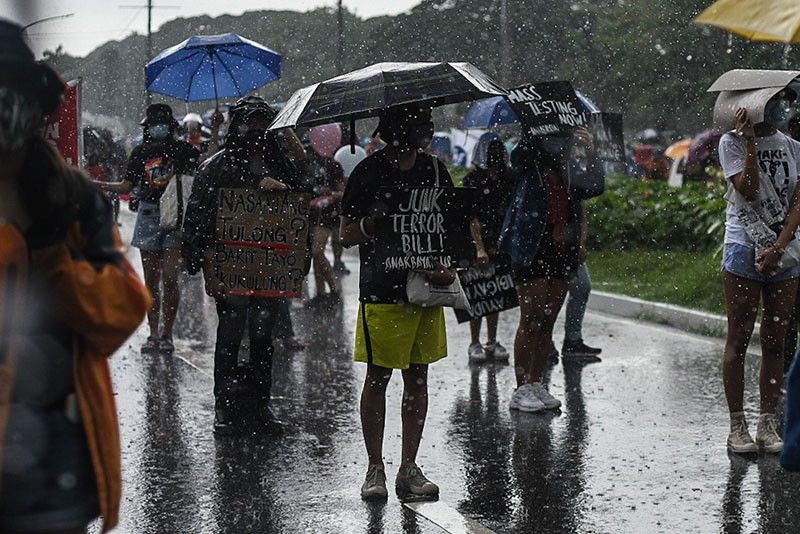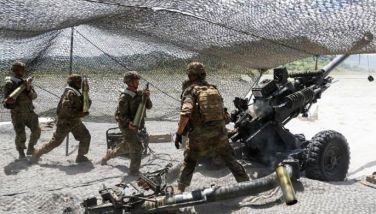Commentary: Freedom and the anti-terrorism bill

As we celebrate our Independence Day, it is an opportune time to reflect on freedom and made more crucial because of the bill on anti-terrorism.
There is always a kind of dynamic between freedom and law. Freedom allows man to express himself but absolute freedom can also have a downside and if not restrained can destroy the society or the collective.
Hence, laws are legislated to preserve the good of the society and protect the rights of other individuals, including their freedom. Laws serve the purpose of justice and order. But a law can also be unjust when it curtails the very freedom that it is supposed to preserve.
There must, therefore, be a balance between freedom and law otherwise there be will chaos and injustice in the society. Unrestrained freedom and unjust laws always tilt the balance between freedom and law.
But what is this freedom that we are talking about? I am reminded of the notion of freedom that my professor in philosophy, Dr. Florentino Hornedo developed in the context of the personal and social.
Personal because he grounds his notion of freedom on the personal and rational nature of the human individual, and social because this notion of freedom contains a social character, that is through this freedom man becomes socially capable and a positive contributor not only for his personal development but for the betterment of the social condition of himself and his society. Hence he relates freedom with empowerment and development.
In today’s society, we often speak of empowerment as a key component in people’s struggle to free themselves from the often recurring cycles of modern forms of oppression. But how can people be empowered? How can freedom be a kind of empowerment?
It is common to understand freedom as the absence of any form of determination whether externally or internally. Such negative conception of freedom – freedom as simply an absence of all antecedent necessity, can never be a source of empowerment.
Freedom can be a source of empowerment if we recognize the positive side or aspect of freedom, if we recognize it as a positive force in the world, as the real agent or the cause of something. But how can freedom be positive or in what sense can freedom be positive?
Florentino Hornedo is his book “Power to Be: Phenomenology of Freedom” defines freedom as a kind of strength, a dynamic capacity, a power to be, as a kind of autonomous energy. This power or capacity makes action especially for development and justice possible.
Freedom empowers the human person; it capacitates him to develop himself. To be able to grow and develop one must be free; whenever and wherever that capacity or that power is absent there is no freedom and where and when there is no freedom there is no development or advancement either of the person or the society. Based on this understanding he developed the idea of freedom as autonomous energy for being.
Incidentally, the first edition of this book was published months after Martial Law was declared in the Philippines by the late dictator Ferdinand Marcos in 1972. The book would later on be shelved only to reappear in its second edition in 2000.
There are three elements of freedom for Hornedo: autonomy, energy and being.
Autonomy is the condition of being self-governing. To govern is to determine one’s own act and execute one’s own will.
There are two important aspects here, the condition to determine one’s self and to determine one’s action. Freedom is not just the absence of determination from the outside but first and foremost it means that condition where one can determine his own self, create his own self.
When one is free he can determine the course of his own action, he can contemplate on what he wants to do and how he will do it. Autonomy also implies not only the possession of the capacity and power of action but also the independence of the agent from external necessity and external power to actualize its will.
Thus, autonomy should not be interpreted as something that exclude intrinsic dependence of the autonomous being upon its own internal constitutive principle. The self is always bound and is dependent to its natural and intrinsic constitution. This intrinsic dependence makes the self, possible.
In this sense autonomy has two poles, the first is independence from external forces or factors and the second is dependence on one’s internal or natural constitution. Hence, while man is not determined by external forces, he is determined by his own self, by his intrinsic and natural constitution.
Now one of the intrinsic and determining properties of man is rationality. Man determines his own action by relying on his rational capacities. Autonomy therefore is bound to rationality.
One becomes authentically autonomous when he uses his reason to the fullest. By acting rationally which is the predetermining constitutive law of his human nature he acts more freely. An action rationally considered is a freer act.
The next element is energy. Energy is often associated with the physical sciences than with the metaphysical. In philosophy, the preferred term is potency as expounded by St. Thomas. However, potency has a more specific connotation as possibility.
Energy in its common and ordinary sense means capacity for activity or available power. When this notion is applied to human activity to have energy is to be ready and be prepared to act. When one is energized he becomes dynamic and ready to take action. The capacity to act and to determine one’s action becomes actualized and one becomes empowered.
In some cases, an individual may have the natural capacity to do certain things but when he is not empowered, he cannot perform. A man may have the capacity to study but if he is not empowered he cannot do it. He may have the capacity to contribute to the society but if he is not empowered he cannot do it.
So with energy freedom becomes a dynamic force not just a static capacity. This notion of energy as a dynamic capacity for activity or available power is more related to the notion of autonomy as rational self-government or self-determination.
Freedom as autonomy or self-determination is futile when man is not empowered or when he lacks the dynamism. Autonomy as conceptually considered is rather inert; its expression and manifestation requires action. Such autonomous action becomes actual when there is an available power or capacity for action.
Energy then is the capacity or power for actualization of autonomy. Autonomous energy therefore means that force or power in the rational being which makes possible the modes of his operations and his faculties.
Broadly, energy can be applied to that power in the rational being which makes possible the operation and actualization of its faculties, and all other possible modes of the being’s operations.
With autonomous energy, the person is able to act and perform the many functions he is capable of. He becomes dynamic and active. Autonomous energy is the power that precedes every action, the power that sustains it, and the available power that is at the disposal of the operations of the mind and its various instrumentalities.
The last element is being. Being as used in philosophy appears to have at least two distinct modes of usage, the substantive and the participial. In its substantive usage being is used as a noun and is synonymous to that which exists or that which in any way is.
On the other hand, being used as a participle refers to the act of existence. In the first meaning of being something is already finished and its essence is somehow already determined and done. This notion of being can be applied to objects whose essences are already secured.
This is similar to the what the French philosopher Jean-Paul Sartre calls the en soi or in-itself. This notion of being cannot be applied to freedom because there is no freedom that we can speak of with regards to beings that are already determined.
The later sense of being, that is being as act is what we refer here and what we apply to freedom. This participial sense is the more dynamic meaning of being. It means something is not yet finished and that it is still in the process of becoming what it can really be.
This is related to the German philosopher Martin Heidegger's notion of being as the being of man as the Dasein. Man’s being is not yet completed or finished; man must develop and actualize himself to become the being or person he can be.
Thus, to be free is to become and he can only be the being or human individual that he can become when he has the autonomous energy to become. Thus, to be free is not to be static or stagnant but to be dynamic, to grow, to develop; to reach a much fuller existence.
Laws are supposed to empower people and not stifle their development or suppress their rights. Laws are intended to create an environment where people can express their freedom responsibly.
Of course the individual must also realize that the freedom that he possesses carries with it responsibility and the laws are there to make people realize their responsibility and do their duties and responsibilities.
There are apprehensions and anxieties brought about by the present bill on anti-terrorism. These apprehensions and anxieties are not unfounded.
Given the killings that surround the campaign against illegal drugs and the charges levelled against the critics of the government people are naturally anxious and many are protesting against the bill.
A law, per se, as we said has a good purpose – to serve justice and order. But the implementer of the law may have other intentions other than the law itself.
In this sense, a law is like a knife, a knife can be used to cut objects, but it can also be used to cut limbs or lives. So it depends on the intention of the one holding the knife and when he has bad intentions then the knife is dangerous.
The German philosopher Immanuel Kant said that the only good thing is a good will. There are things that are considered good only for certain conditions like power, wealth, intelligence.
Intelligence is good only if applied with a good intention or good will. Some people use their intelligence to abuse others or do evil things. A law, this bill in particular is good if implemented with good intention or good will.
The good will of the law must include the respect for freedom and the creation of an environment where people can express themselves. It must be an enabling factor, a source of empowerment of people.
Freedom as we have said is power to be, the power to actualize one’s self. Freedom as an autonomous energy for being is a dynamic capacity or the power of the human person to develop himself and attain a higher level of existence (personally, socially, politically, culturally, etc.) and execute his own actions through his own determination based on his rational nature.
This can be possible if we have laws that empower rather than suppress.
Jove Jim Aguas is a philosophy professor affiliated with the Philosophy Department of the University of Santo Tomas.
- Latest
























